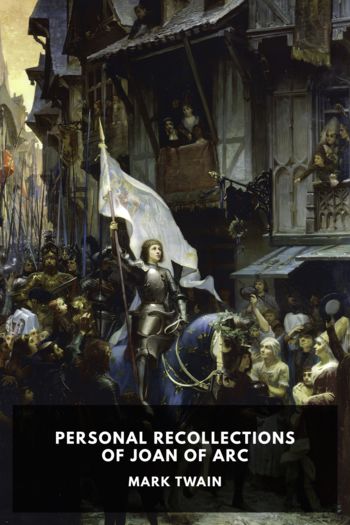A Connecticut Yankee in King Arthur’s Court by Mark Twain (my reading book .TXT) 📕

- Author: Mark Twain
Book online «A Connecticut Yankee in King Arthur’s Court by Mark Twain (my reading book .TXT) 📕». Author Mark Twain
Get word to my friends! I thanked him; I couldn’t do less; and about this time a lackey came to say I was wanted; so Clarence led me in and took me off to one side and sat down by me.
Well, it was a curious kind of spectacle, and interesting. It was an immense place, and rather naked—yes, and full of loud contrasts. It was very, very lofty; so lofty that the banners depending from the arched beams and girders away up there floated in a sort of twilight; there was a stone-railed gallery at each end, high up, with musicians in the one, and women, clothed in stunning colors, in the other. The floor was of big stone flags laid in black and white squares, rather battered by age and use, and needing repair. As to ornament, there wasn’t any, strictly speaking; though on the walls hung some huge tapestries which were probably taxed as works of art; battle-pieces, they were, with horses shaped like those which children cut out of paper or create in gingerbread; with men on them in scale armor whose scales are represented by round holes—so that the man’s coat looks as if it had been done with a biscuit-punch. There was a fireplace big enough to camp in; and its projecting sides and hood, of carved and pillared stonework, had the look of a cathedral door. Along the walls stood men-at-arms, in breastplate and morion, with halberds for their only weapon—rigid as statues; and that is what they looked like.
In the middle of this groined and vaulted public square was an oaken table which they called the Table Round. It was as large as a circus ring; and around it sat a great company of men dressed in such various and splendid colors that it hurt one’s eyes to look at them. They wore their plumed hats, right along, except that whenever one addressed himself directly to the king, he lifted his hat a trifle just as he was beginning his remark.
Mainly they were drinking—from entire ox horns; but a few were still munching bread or gnawing beef bones. There was about an average of two dogs to one man; and these sat in expectant attitudes till a spent bone was flung to them, and then they went for it by brigades and divisions, with a rush, and there ensued a fight which filled the prospect with a tumultuous chaos of plunging heads and bodies and flashing tails, and the storm of howlings and barkings deafened all speech for the time; but that was no matter, for the dogfight was always a bigger interest anyway; the men rose, sometimes, to observe it the better and bet on it, and the ladies and the musicians stretched themselves out over their balusters with the same object; and all broke into delighted ejaculations from time to time. In the end, the winning dog stretched himself out comfortably with his bone between his paws, and proceeded to growl over it, and gnaw it, and grease the floor with it, just as fifty others were already doing; and the rest of the court resumed their previous industries and entertainments.
As a rule, the speech and behavior of these people were gracious and courtly; and I noticed that they were good and serious listeners when anybody was telling anything—I mean in a dogfightless interval. And plainly, too, they were a childlike and innocent lot; telling lies of the stateliest pattern with a most gentle and winning naivety, and ready and willing to listen to anybody else’s lie, and believe it, too. It was hard to associate them with anything cruel or dreadful; and yet they dealt in tales of blood and suffering with a guileless relish that made me almost forget to shudder.
I was not the only prisoner present. There were twenty or more. Poor devils, many of them were maimed, hacked, carved, in a frightful way; and their hair, their faces, their clothing, were caked with black and stiffened drenchings of blood. They were suffering sharp physical pain, of course; and weariness, and hunger and thirst, no doubt; and at least none had given them the comfort of a wash, or even the poor charity of a lotion for their wounds; yet you never heard them utter a moan or a groan, or saw them show any sign of restlessness, or any disposition to complain. The thought was forced upon me: “The rascals—they have served other people so in their day; it being their own turn, now, they were not expecting any better treatment than this; so their philosophical bearing is not an outcome of mental training, intellectual fortitude, reasoning; it is mere animal training; they are white Indians.”
III Knights of the Table RoundMainly the Round Table talk was monologues—narrative accounts of the adventures in which these prisoners were captured and their friends and backers killed and stripped of their steeds and armor. As a general thing—as far as I could make out—these murderous adventures were not forays undertaken to avenge injuries, nor to settle old disputes or sudden fallings out; no, as a rule they were simply duels between strangers—duels between people who had never even been introduced to each other, and between whom existed no cause of offense whatever. Many a time I had seen a couple of boys, strangers, meet by





Comments (0)